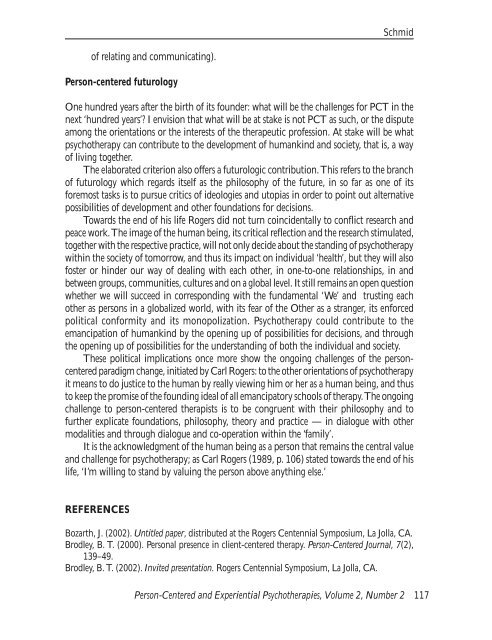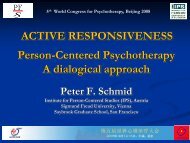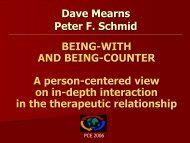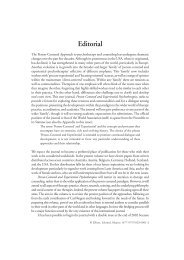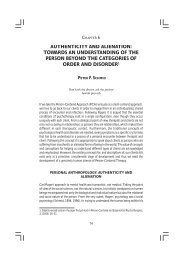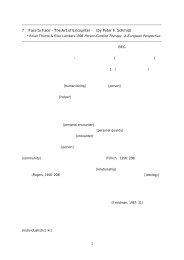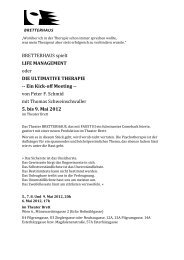The Characteristics of a Person-Centered ... - Peter F. Schmid
The Characteristics of a Person-Centered ... - Peter F. Schmid
The Characteristics of a Person-Centered ... - Peter F. Schmid
- No tags were found...
You also want an ePaper? Increase the reach of your titles
YUMPU automatically turns print PDFs into web optimized ePapers that Google loves.
<strong>Schmid</strong><strong>of</strong> relating and communicating).<strong>Person</strong>-centered futurologyOne hundred years after the birth <strong>of</strong> its founder: what will be the challenges for PCT in thenext ‘hundred years’? I envision that what will be at stake is not PCT as such, or the disputeamong the orientations or the interests <strong>of</strong> the therapeutic pr<strong>of</strong>ession. At stake will be whatpsychotherapy can contribute to the development <strong>of</strong> humankind and society, that is, a way<strong>of</strong> living together.<strong>The</strong> elaborated criterion also <strong>of</strong>fers a futurologic contribution. This refers to the branch<strong>of</strong> futurology which regards itself as the philosophy <strong>of</strong> the future, in so far as one <strong>of</strong> itsforemost tasks is to pursue critics <strong>of</strong> ideologies and utopias in order to point out alternativepossibilities <strong>of</strong> development and other foundations for decisions.Towards the end <strong>of</strong> his life Rogers did not turn coincidentally to conflict research andpeace work. <strong>The</strong> image <strong>of</strong> the human being, its critical reflection and the research stimulated,together with the respective practice, will not only decide about the standing <strong>of</strong> psychotherapywithin the society <strong>of</strong> tomorrow, and thus its impact on individual ‘health’, but they will als<strong>of</strong>oster or hinder our way <strong>of</strong> dealing with each other, in one-to-one relationships, in andbetween groups, communities, cultures and on a global level. It still remains an open questionwhether we will succeed in corresponding with the fundamental ‘We’ and trusting eachother as persons in a globalized world, with its fear <strong>of</strong> the Other as a stranger, its enforcedpolitical conformity and its monopolization. Psychotherapy could contribute to theemancipation <strong>of</strong> humankind by the opening up <strong>of</strong> possibilities for decisions, and throughthe opening up <strong>of</strong> possibilities for the understanding <strong>of</strong> both the individual and society.<strong>The</strong>se political implications once more show the ongoing challenges <strong>of</strong> the personcenteredparadigm change, initiated by Carl Rogers: to the other orientations <strong>of</strong> psychotherapyit means to do justice to the human by really viewing him or her as a human being, and thusto keep the promise <strong>of</strong> the founding ideal <strong>of</strong> all emancipatory schools <strong>of</strong> therapy. <strong>The</strong> ongoingchallenge to person-centered therapists is to be congruent with their philosophy and t<strong>of</strong>urther explicate foundations, philosophy, theory and practice — in dialogue with othermodalities and through dialogue and co-operation within the ‘family’.It is the acknowledgment <strong>of</strong> the human being as a person that remains the central valueand challenge for psychotherapy; as Carl Rogers (1989, p. 106) stated towards the end <strong>of</strong> hislife, ‘I’m willing to stand by valuing the person above anything else.’REFERENCESBozarth, J. (2002). Untitled paper, distributed at the Rogers Centennial Symposium, La Jolla, CA.Brodley, B. T. (2000). <strong>Person</strong>al presence in client-centered therapy. <strong>Person</strong>-<strong>Centered</strong> Journal, 7(2),139–49.Brodley, B. T. (2002). Invited presentation. Rogers Centennial Symposium, La Jolla, CA.<strong>Person</strong>-<strong>Centered</strong> and Experiential Psychotherapies, Volume 2, Number 2 117


